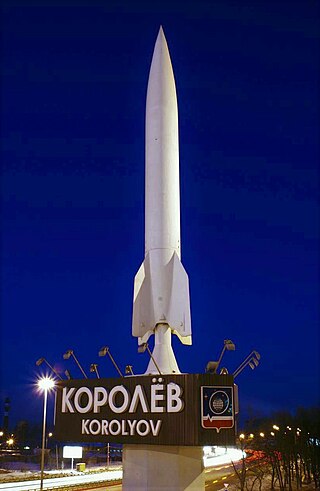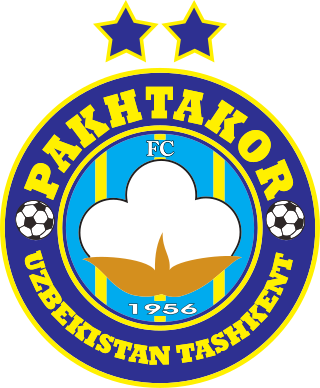
Professional Football Club CSKA, commonly referred to as CSKA Moscow or CSKA Moskva outside of Russia, or simply as CSKA, is a Russian professional football club. It is based in Moscow, playing its home matches at the 30,000-capacity VEB Arena. It plays in red and blue colours, with various plain and striped patterns having been used.

Association football is the most popular sport in Russia, beating ice hockey by a huge margin. Men's football is overseen by the Russian Football Union, having the Russian Premier League as the first tier of the Russian football league system, with the Russian Football National League being the second tier.

The Russia national rugby league team, nicknamed The Bears, represents Russia in international rugby league tournaments and other rugby league fixtures. The Bears, played their first fixtures against two British club sides: York Wasps and Fulham RLFC. In 2013, Russia became a full member of the Rugby League International Federation.

Korolyov or Korolev is an industrial city in Moscow Oblast, Russia, well known as the cradle of Soviet and Russian space exploration. As of the 2010 Census, its population was 183,402, the largest as a science city. As of 2018, the population was more than 222,000 people.

FC Lokomotiv Moscow is a Russian professional football club based in Moscow. Lokomotiv have won the Russian Premier League on three occasions; the Soviet Cup twice; and the Russian Cup a record nine times. After the 2022 Russian invasion of Ukraine, the European Club Association suspended all Russian teams from participation in international competition.

The Russian Premier League, also written as Russian Premier Liga, is the top division professional association football league in Russia. It was established at the end of 2001 as the Russian Football Premier League and was rebranded with its current name in 2018. From 1992 through 2001, the top level of the Russian football league system was the Russian Football Championship.
Rugby league is a team sport in Russia. The Russian Association of Rugby League Clubs (ARLK) is the governing body of rugby league in Russia. After the 2022 Russian invasion of Ukraine, the International Rugby League and European Rugby League banned Russia from all international rugby league competitions.
The Soviet Top League, known after 1970 as the Higher League, served as the top division (tier) of Soviet Union football from 1936 until 1991. The league's name was a conditional designation used for brevity since being completely owned and governed by the Football Federation of the Soviet Union. The full official name was the USSR Championship in football: Top League. An attempt to create an independent league as autonomously governed organization during "perestroika" period was denied by the Federation due to political culture in the Soviet Union.

Rugby union in Russia is a moderately popular sport. Russia was in 2011 ranked 20th worldwide by the World Rugby, having over three hundred clubs and close to 22,000 players nationally. Russian Rugby Championship is the top-level professional competition held in Russia. Krasnoyarsk, in the middle of Siberia, is traditionally the heartland of Russian rugby.

Pakhtakor Football Club is an Uzbek professional football club, based in the capital city of Tashkent, that competes in the Uzbekistan Super League. Pakhtakor literally means "cotton-grower".
The Russian Rugby Championship, officially known as the Pari - Russian Rugby Championship for sponsorship reasons, is Russia's top level professional men's rugby union competition. The Russian Rugby Championship is run by Russian Rugby Union and is contested by 10 teams as of the 2019-2020 season.

Rugby league is a team sport that is played in several regions of Spain.

Rugby union in the Soviet Union was a moderately popular sport. It was most popular in the Georgian SSR; parts of the Russian SFSR such as Moscow and certain regions in Siberia like Krasnoyarsk; and Alma-Ata, the capital of the Kazakh SSR. Rugby enjoyed a more limited popularity in the Ukrainian SSR, Minsk in the Byelorussian SSR and parts of the RSFSR such as Leningrad and areas in Southern Russia, including Krasnodar. Rugby gained a significant following due to the vast size of the Soviet Union, but was never a major sport; despite many attempts to develop the sport, which Soviet citizens came to nickname the "leather melon" due to the shape of the ball. Still, an early championship in 1960 gives an idea of the sheer scale of Soviet rugby: one hundred teams from over thirty cities took part.
Boris Petrovich Gavrilov was a Soviet rugby union player, who played for the national team. He was a Soviet Master of Sport.
The 2010 Russian Professional Rugby League season was the sixth edition of Russia's newly formatted top-flight rugby union competition, the Professional Rugby League ("RPRL"). The 2010 Professional Rugby League season has seen a transition to a traditional one league round-robin format with 8 teams taking place between May and September 2010. VVA Podmoskovye Monino are the reigning champions.
The 2009 Russian Professional Rugby League season was the fifth season of the Russian Professional Rugby League.
The 2011 Russian Professional Rugby League season will be the seventh edition of the competition since its transition from the Super League.
Evgeny Isayevich Klebanov, known also as Eugene Klebanov, is a Russian former rugby union player, league coach, Master of Sports of the USSR, Merited Coach of Russia in rugby, five-times winner of the Moscow rugby championship and runner-up at the USSR rugby championship in 1990. He has coached for a long time Russia at the 2003, 2004 and 2005 European Nations Cups and other international tournaments. Klebanov also trained over 100 Masters of Sports of the USSR and Russia. Currently he is the head coach of the National Rosbol Federation of Russia and the Superball Academy.
Ekaterina Ulanova is a Russian volleyball player. She competed for the Russia women's national volleyball team in the 2008 and the 2012 Summer Olympics. She also won the gold medal at the 2014 FIVB Club World Championship, playing with Dinamo Kazan.
The Association of Rugby League Clubs is the governing body for rugby league in Russia. The association was formed in 2010, bringing together amateur clubs and regional RRLF clubs after the expulsion of the Russian Rugby League Federation and essentially rugby league itself by the Order of the Ministry of Tourism RUSSIA № 21 from State Register of Sports of Russia.










